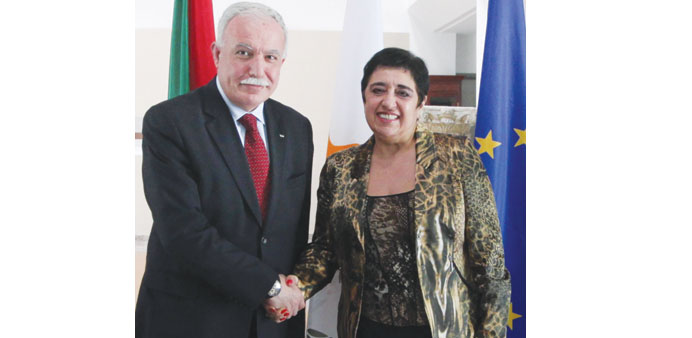AFP/Nicosia
|
|
Cyprus said yesterday it has upgraded its relations with the Palestinians to full diplomatic mission status, one of just eight European Union countries to do so.
The decision was announced by Foreign Minister Erato Kozakou-Marcoullis during an official visit by her Palestinian counterpart Riyad al-Malki.
“I informed my Palestinian counterpart of the decision of the government to upgrade the status of the Palestinian diplomatic representation in Cyprus from that of a diplomatic mission to that of an embassy of the State of Palestine,” Marcoullis told reporters.
She said this “important decision” was in line with the recognition of the Palestinian state in 1988 by Cyprus, and follows seven other EU members that have recognised a Palestinian state—Bulgaria, the Czech Republic, Hungary, Malta, Poland, Romania, and Slovakia.
A Cyprus Representation Office opened in Ramallah in the West Bank in 2009.
Malki said the decision sent a “very important message,” adding: “We hope this courageous step taken by Cyprus will be taken by others in the European Union.”
Palestinian ambassador to Nicosia Walid al-Hassan told AFP: “Now we have diplomatic representation in Cyprus like any other country in the world. This applies to our legal situation and the immunity which accompanies diplomatic status.”
On November 29, Cyprus also voted in favour of the successful Palestinian bid for upgraded UN General Assembly status.
“All official correspondence will now be done in the name of the State of Palestine. Cyprus is the first European state to upgrade Palestinian status since the UN vote,” Hassan said.
Marcoullis said Cyprus expressed “full support” for resolving concerns of Palestinian aspirations for statehood and sovereignty and those of Israel for security, through a comprehensive negotiated peace based on a two-state solution.
Nicosia backs an enhanced EU role in efforts for renewed and substantial peace efforts in 2013.
Cyprus has expressed “deep dismay and strong opposition” at controversial Israeli settlement plans for an area near annexed Arab East Jerusalem known as E1.
“The E1 plan, if implemented, would seriously undermine the prospects of a negotiated resolution of the conflict,” Marcoullis said.
l Palestinian President Mahmoud Abbas convened a conference of all Palestinian organisations in the Egyptian capital yesterday, in a new effort to reconcile his Fatah movement with the rival Hamas.
The meeting is of the provisional governing body of the Palestine Liberation Organisation, which is charged with bringing non-members Hamas and Islamic Jihad into the PLO.
Fatah and Hamas, which respectively govern the autonomous areas of the West Bank and the Gaza Strip, signed an Egypt-mediated reconciliation agreement on April 27, 2011 in Cairo.
But most of its clauses went unheeded and deadlines were constantly postponed.
Yesterday’s conference was to deal with implementing some of the key terms of the agreement, particularly organising long-awaited elections and the formation of a transitional non-partisan government to oversee parliamentary and presidential polls.
The PLO provisional governing council met in Cairo for the first time in December 2011. It includes PLO leaders and the heads of groups currently under its umbrella, as well as Hamas, Islamic Jihad and independent personalities.
Last week Hamas authorised the Central Elections Commission (CEC) to start registering voters in the Gaza Strip, removing a major obstacle to reconciliation with Fatah.
“When the elections commission starts its work, so will the consultations on national consensus government begin,” Abbas said at the time.
The CEC said that voter registration would be carried out between February 11 and 18.

